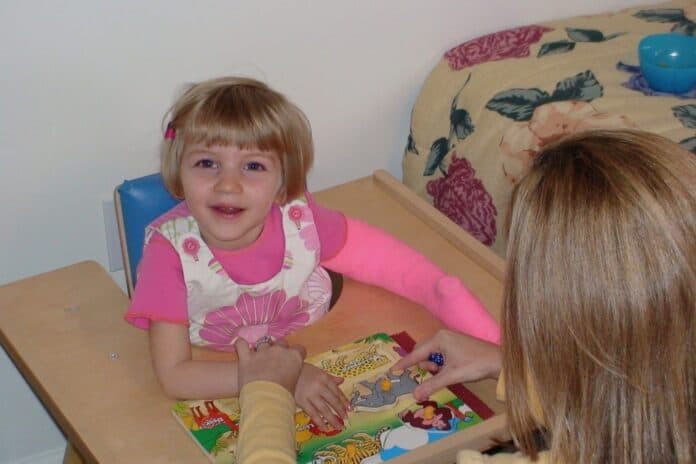If little Arden Grim wanted to see the fuzzy red guy from Sesame Street, she had to eat her breakfast.
Elmo was at the bottom of her bowl.
To get there, she had to take up her spoon and eat with her right hand, the one severely weakened by the stroke she suffered before she was born. Cerebral palsy limits use of her right arm and leg.
Grim was not yet 3 years old.
She’s now 21, and finding Elmo with her spoon is among her oldest memories. Tellingly, it’s a memory from an innovative and intensive therapy originally developed at the Neuromotor Research Clinic, then at the University of Alabama at Birmingham.
A decade and a half later, Grim is back at the clinic — now based at the Fralin Biomedical Research Institute at VTC in Roanoke — but as a summer undergraduate research fellow, where she has a unique perspective on kids going through the same therapy.
“I see their level of functioning and they remind me of myself at their age, and that’s just been really cool,” said Grim, who is in the research institute’s neuroSURF program. “Being at the clinic again, I have come to realize just how much intensive therapy has shaped who I am today.”
She’s crunching data with Stephanie DeLuca, associate professor and the clinic’s director, and learning alongside Mary Rebekah Trucks and Dory Wallace, the therapists who worked with her until she was 7.
Undergraduates in neuroSURF spend 10 weeks conducting hands-on neuroscience research, but Trucks and the rest of the team are getting more from their former patient than research help.
“Arden gives a lot of insight from her lived experience,” said Trucks, associate director of clinical education, training, and implementation. “I see how she unzips her bookbag, stabilizing with her right and pulling the zipper with her left. I can ask her, ‘What about cooking? Tell me how you cut a potato.’”
Just as importantly, she’s a model for children in the clinic and their families.
“It’s monumental for the kids and their folks to see a cool, young adult like Arden, who was in this therapy when she was their age,” Trucks said. “And look at her now. Because one of the questions for parents is, ‘What is my child going to look like in a decade or two?’”
ACQUIRE Therapy was developed more than 20 years ago as a form of Constraint-Induced Movement Therapy by DeLuca and Sharon Landesman Ramey, along with Karen Echols, a University of Alabama at Birmingham colleague.
The therapy is intensive — multiple hours each day over a period of weeks — but is play-based fun. Children receive the therapy as part of clinical studies into its effectiveness.
DeLuca and Landesman Ramey later moved the clinic to Virginia Tech’s Fralin Biomedical Research Institute and continued their research. Landesman Ramey is a professor and distinguished research scholar at the institute.
Grim’s parents learned about the therapy from other parents in Minnesota, where Grim was born.
“The doctors told my parents that I would never walk and that I would never talk and that I would never be successful academically,” Grim said. Both are medical professionals — her father is an anesthesiologist and her mother is a nurse — and were determined to prove that prognosis wrong.
Grim made her first visit to Alabama for ACQUIRE Therapy when she was 2 years old and returned three more times over the years until 2011.
“She’s so smart, and I always remember her being so diligent and such a hard worker and so compliant,” Trucks said.
Grim recalled baking and eating and practicing daily living activities. She had started piano lessons and worked to improve playing with her right hand with Trucks, herself a lifelong pianist.
Back in Minnesota, Grim’s determination and learning continued. She kept up with piano and took up competitive dance. Between her parents’ influence, her clinic experiences, and being diagnosed with epilepsy when she was 10, she was drawn to study neuroscience. She wants to go to medical school.
During her freshman year at Smith College in Northampton, Massachusetts, she saw a flyer for the neuroSURF program. She took a photo on her phone and saved it until the time felt right.
In the meantime, she began to reconnect with Trucks and others in Roanoke through a group called Friends of ACQUIRE. When she applied for the neuroSURF program, she let them know she hoped to spend her summer working with the clinic.
“It’s funny because some of the looks that she’ll give me now, it’s like, ‘Oh my goodness, this is you when you were 6 years old.’ It’s the same look,” Trucks said.
Grim’s research involves analyzing data on children’s achievements during ACQUIRE Therapy and examining whether there are differences between getting three hours or six hours of therapy a day for four weeks.
“There are many aspects to understanding if a therapy works,” DeLuca said. “We often look at standardized measurements, but Arden’s project is considering real goals and real accomplishments, the types of things children need to do every day. Excitingly, she has found some differences this summer that I think we can expand on.”
Grim will return to Smith for her senior year, where she leads a group she founded her first year for students with disabilities of all kinds — called Dis-Organizing.
She’ll also take a leadership course and plan an epilepsy awareness project focused on providing seizure first aid trainings to local communities.
She and DeLuca plan for her to build on the project she started during the summer remotely.
“Being able to see now, as an adult, the impact of the clinic’s work has been really incredible,” Grim said. She sees children do things they weren’t able to when they arrived. “I knew that it was helping me as a kid, but now I’m recognizing more and more how impactful it really is. This clinic is changing lives.”
By Matt Chittum


